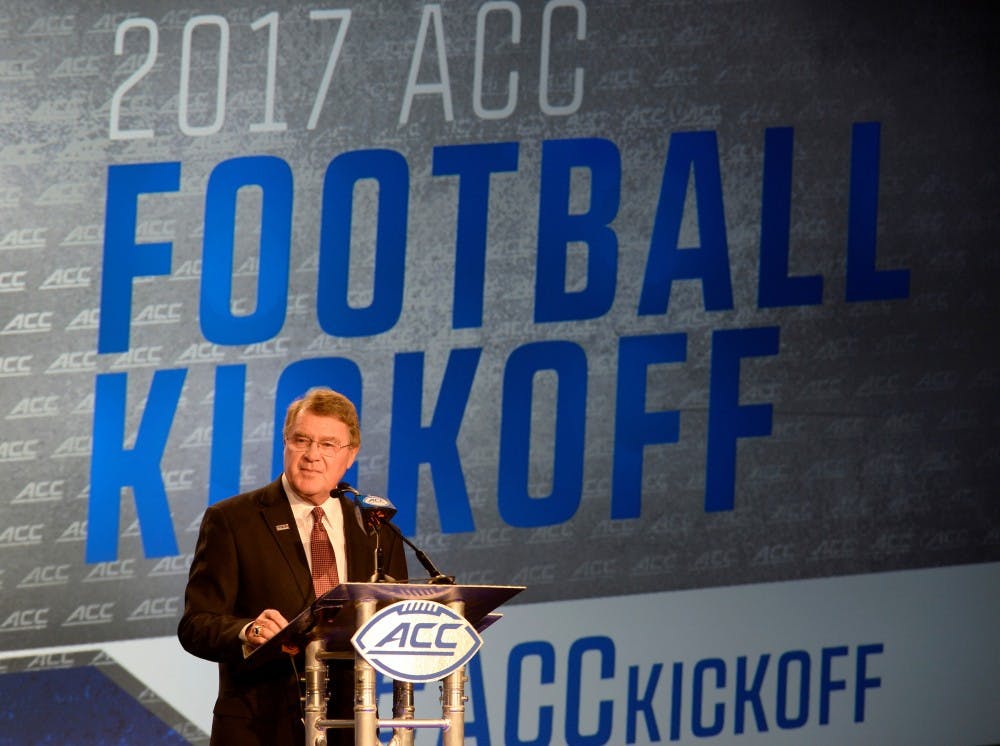John Swofford served as the athletic director at UNC from 1980 to 1997. In July 1997, he was named the fourth commissioner of the Atlantic Coast Conference, a job he will retain until his upcoming retirement in June 2021. Before his retirement, we talked with Swofford to discuss the lessons he learned throughout his life, the difficulties of his time as commissioner and whether he had any regrets from his career.
This interview has been edited for brevity and clarity.
The Daily Tar Heel: What were some key moments in your career that were the most important lessons?
John Swofford: Shortly after I graduated from Carolina, I was working in a family business my father had started and older brothers were running since he had passed away, and I went to work with them. I found out pretty quickly that that was not where I wanted my path to be, and so I called Homer Rice, the athletic director at Carolina, and asked him if I could come down and speak with him about getting into sports administration. I had a nice conversation with him, in which he told me about a master's degree program at Ohio University. Homer became a mentor to me, and is to this day. I'm 72, so I guess it's a little odd to say you still have a mentor. That taught me to listen to people who know what they're talking about and develop relationships that can guide you in the right direction.
DTH: During your tenure, North Carolina won at least one national championship every year. How did you find the people who could propel that success?
JS: I enjoyed hiring coaches. A lot of athletic directors will tell you that they don't enjoy that. Obviously, you have to look for people who know what coaching is all about, the technicalities of their particular sport, and have integrity and character. But I always thought that fit was extremely important. This individual may be an excellent fit for that school, but not this particular school. So it had to be the right fit, and someone that understood that Carolina was all about the balance of athletics and academics competing at the national level, but doing it with integrity. There wouldn’t and shouldn't be corners cut. When a number of the coaches I hired are still there 25 years later, it's really gratifying, because I think it means it was the right approach. The last criteria I always had in hiring coaches was if I’d want my son or daughter to play for that coach. Dr. Beth Miller was my associate director, working with Olympic sports for most of my tenure. She was terrific and gave me a lot of input, particularly in hiring Olympic coaches.
DTH: When people look back on your tenure with the ACC, what do you think they misunderstand most?
JS: Probably the most controversial part of my tenure was expansion. The majority of the league shared the vision that, if we did not expand, we could lose quality members from the conference and the ACC could lose its national prominence. The trick was growing to improve our marketplaces and our geographic footprint, particularly with football. While we have had some tremendous football teams, programs and players, we didn't have the depth and consistency that a number of other conferences had. We knew we'd have to develop that in order to keep up, but we didn't want to do it at the expense of basketball, because basketball was so important to this league and its evolution. Fortunately, we're stronger in that sport, we have a depth of teams and we've got the markets to support it. At the same time, the league has been able to continue and maintain the tremendous competitiveness that it's had for decades in the sport of men's basketball while developing women's basketball as well. It's the same with the Olympic sports. In the end, it served the league well, but at the time, the path to get there was controversial and certainly not easy.
DTH: What are your biggest regrets from your career?




